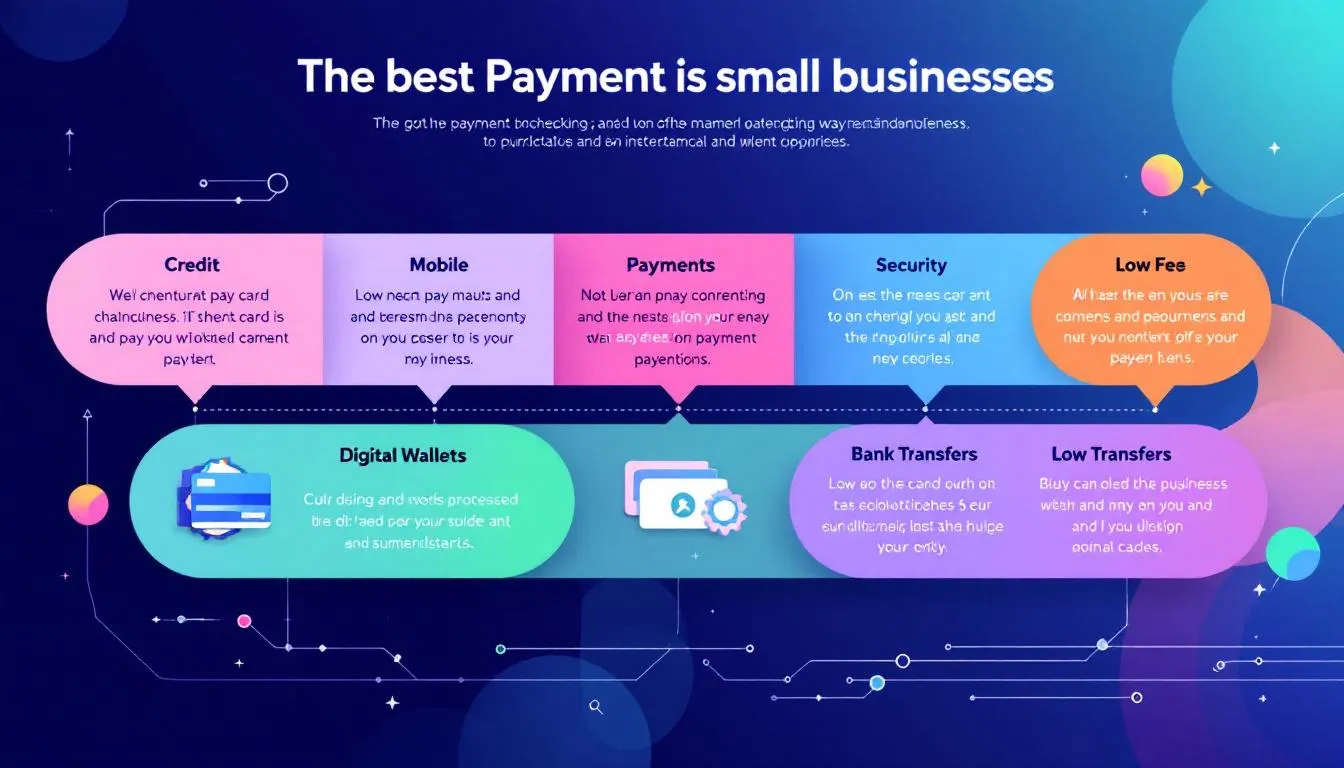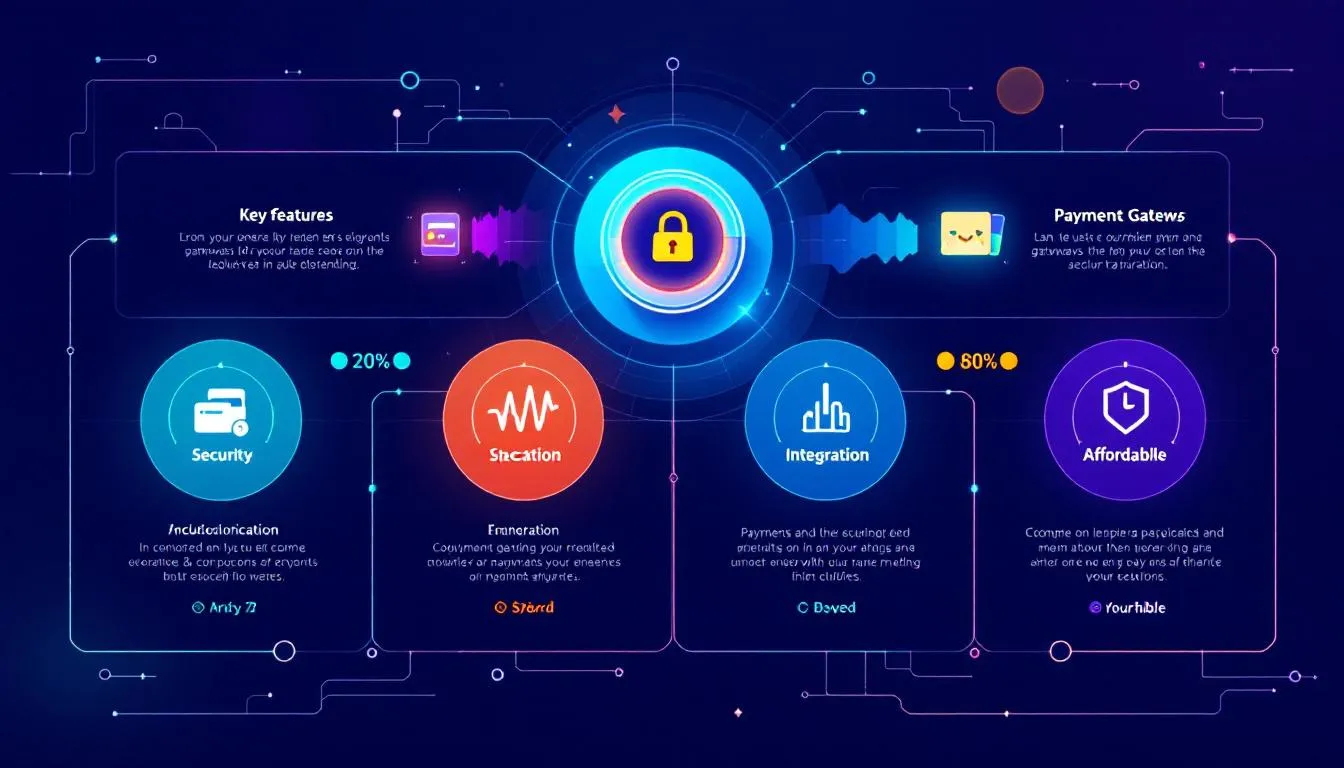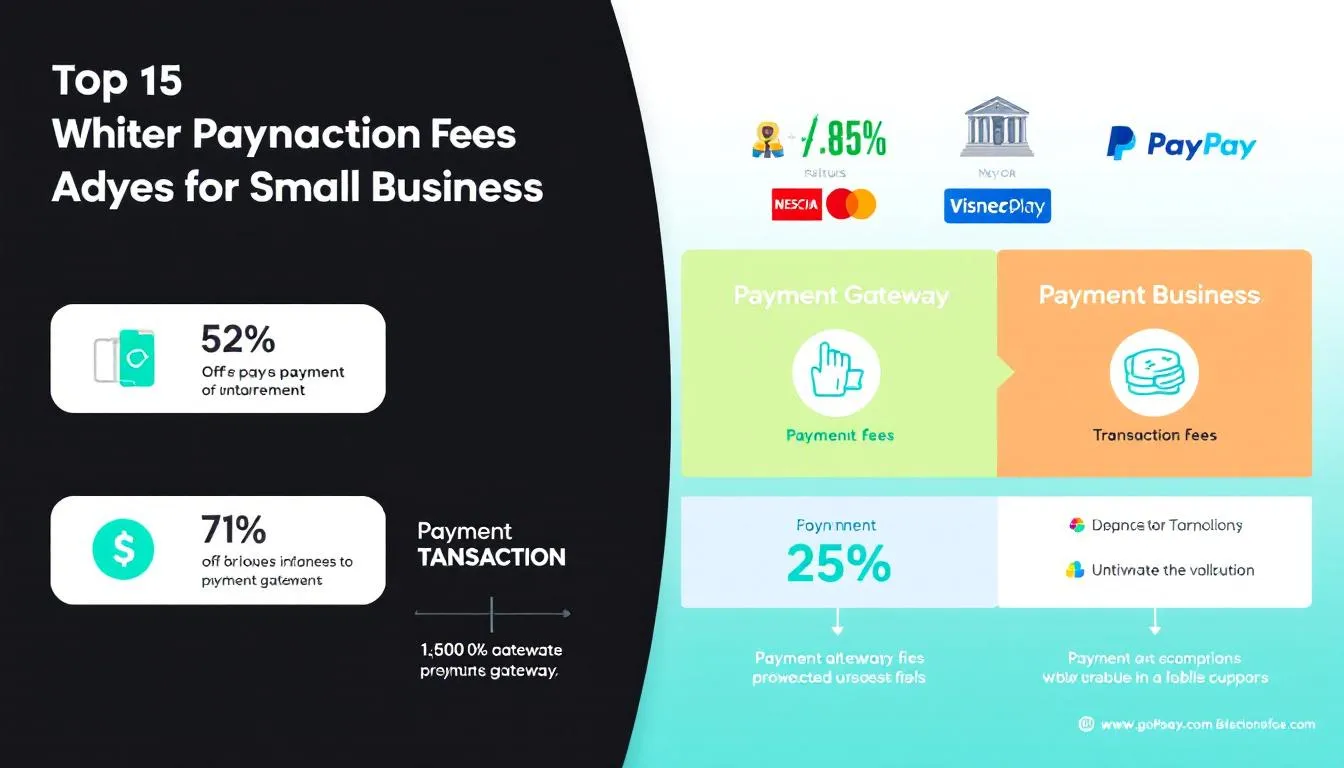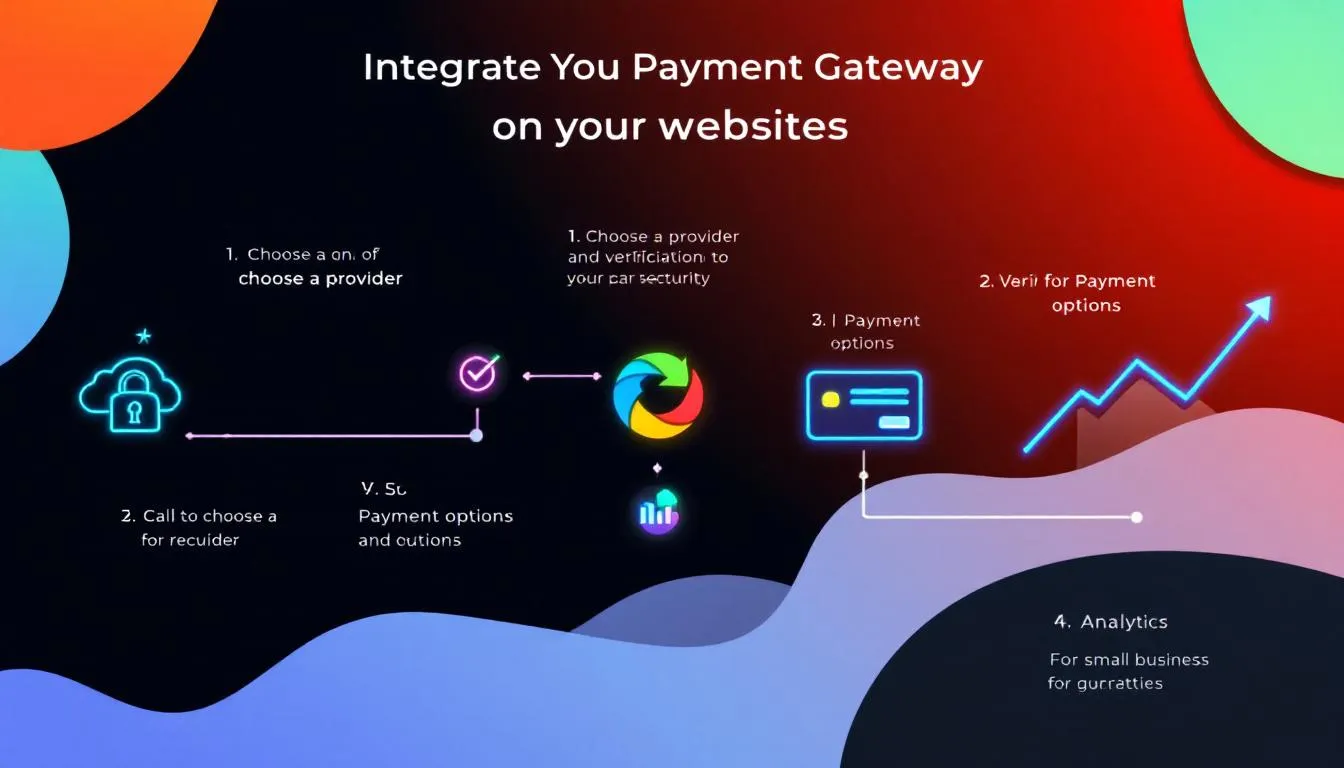Key Takeaways
- Selecting the right payment gateway is essential for small businesses to streamline payment processes and enhance customer satisfaction.
- Key features to consider when choosing a payment gateway include transaction types, fee structures, security measures, and integration capabilities.
- Top payment gateways like PayPal, Stripe, and Square offer distinct advantages, including user-friendly interfaces, flexible pricing models, and robust security features tailored for small businesses.
Top 7 Payment Gateways for Small Businesses

Selecting an appropriate payment gateway provider is vital for small businesses to streamline payment processes and boost customer satisfaction. With nearly 100 payment gateways reviewed, we’ve narrowed down the best payment gateways tailored specifically for smaller businesses. These gateways not only capture and transfer card data securely but also support a variety of payment methods, including accepting card payments, in-person, online, and mobile transactions.
For small businesses, ease of installation and use are critical when choosing a payment gateway. Here are the top 7 payment gateways, along with detailed insights into their features, fees, and suitability for different business needs.
PayPal
PayPal stands as one of the most recognized payment gateways globally, known for its user-friendly interface and wide range of payment options, including major credit cards, debit cards, and PayPal credit. This versatility makes it a go-to choice for many small businesses looking to accept payments both online and in-person. The platform’s ability to handle recurring payments and international transactions further enhances its appeal, especially for users who have a PayPal account.
However, PayPal’s relatively high transaction fees can be a significant drawback for small businesses. These fees typically include a percentage of the transaction amount plus a fixed fee, which can impact overall operational costs.
However, the convenience and security offered by PayPal often outweigh cost considerations, securing its place as a top payment gateway for small businesses.
Stripe
Stripe is a robust payment gateway that offers a comprehensive range of payment options, including credit and debit cards, as well as local payment methods. With support for over 135 currencies, Stripe is ideal for businesses with international customers. Its intuitive interface and efficient transaction management make it particularly suitable for e-commerce businesses.
Stripe’s standout features include:
- Instant transaction processing with immediate confirmation, which significantly enhances the customer experience.
- An implementation wizard that simplifies setup, enabling businesses to start accepting payments quickly.
- Advanced analytics tools that provide valuable insights into sales performance and customer behavior.
While Stripe generally takes between 3 to 7 business days for standard payouts, it offers next-day payouts for an additional 1% fee. This flexibility, combined with its comprehensive feature set, makes Stripe a top choice for businesses looking to streamline their payment processing.
Square
Square is an excellent option for businesses that sell both online businesses and offline. Known for its clear pricing structure, Square does not charge monthly subscription fees, making it a cost-effective solution for small businesses. The platform provides next-day payouts or allows businesses to customize their payout schedule, offering flexibility in managing cash flow.
While Square’s in person transactions service is not the cheapest, its ease of use and comprehensive features still make it a popular choice among small business owners.
Shopify Payments
Shopify Payments is specifically designed for eCommerce stores using the Shopify platform. This built-in payment processing solution eliminates the need for third-party transaction fees, as only Shopify plan fees apply. The payment processing fees for Shopify Payments start at 2.9% + $0.30 per transaction, making it a competitive option for Shopify users.
To use Shopify Payments, businesses must have an active Shopify plan, which starts at $39 per month. While this requirement might seem restrictive, the seamless integration with Shopify stores and the ability to handle high-volume transactions across multiple channels make it an attractive choice for e-commerce businesses.
Helcim
Helcim employs an interchange-plus pricing model, which:
- Helps high-volume businesses save on transaction fees compared to flat-rate pricing
- Offers a transparent pricing structure
- Is particularly beneficial for businesses with significant transaction volumes
- Eliminates monthly fees and contracts
Helcim offers cost-effective pricing and a wide range of payment services, including:
- Invoicing
- Virtual terminal software
- POS hardware and software
- Recurring payment processing
This comprehensive suite of services enhances operational efficiency by allowing businesses to manage transactions effectively across various platforms, aligning with their business model.
Helcim’s commitment to providing flexible and transparent payment solutions makes it an excellent choice for businesses looking to optimize their payment processing and reduce costs.
Authorize.net
Authorize.net is a reliable payment gateway known for its advanced fraud detection tools, which help protect businesses against unauthorized transactions. This robust security feature makes Authorize.net particularly suitable for businesses that prioritize data protection and fraud prevention.
In addition to its strong security features, Authorize.net offers a comprehensive payment processing service, making it a dependable choice for businesses of all sizes. Whether you’re processing credit card payments, online transactions, or recurring payments, Authorize.net provides the tools needed to manage your payment processes securely and efficiently.
GoodSolutions.tech Payments
GoodSolutions.tech Payments provides an all-in-one solution that automates routine tasks, allowing businesses to focus on growth. Key features include:
- Automated payment processing that reduces manual entry errors
- Streamlined operations that improve efficiency
- Multilingual support to cater to a diverse customer base
These features make it an attractive option for businesses that serve international customers with international payments.
With competitive low transaction fees, GoodSolutions.tech Payments is an excellent choice for growing businesses looking for a cost-effective and efficient payment processing solution. The platform’s comprehensive features and focus on automation make it a valuable tool for businesses aiming to optimize their payment processes.
Key Features to Look for in a Payment Gateway

To choose the best payment gateway, businesses must evaluate several key features, including:
- Business requirements
- Transaction types
- Average volume
- Desired features
- Costs
- Security
Understanding the fee structure and potential hidden costs can help businesses avoid unexpected expenses and select a gateway that offers long-term value.
Flexibility in services, robust analytics, and the ability to support different card types and currencies are also important considerations. The following sections will delve into these features in more detail, providing insights into what businesses should look for when choosing a payment gateway.
Security and Fraud Prevention
Security is paramount in payment processing. Key measures include:
- Ensuring PCI DSS compliance to protect cardholder data and reduce fraud risk.
- Using secure payment gateways with encryption protocols to safeguard customer payment information.
- Implementing Address Verification Service (AVS) to enhance security.
- Utilizing tokenization to reduce the risk of unauthorized transactions and chargebacks.
Regular system updates are also crucial for maintaining the security of payment processing systems. By keeping the system up-to-date, businesses can protect themselves against emerging threats and ensure that their payment processes remain secure.
Integration and Compatibility
Efficient payment processing requires smooth integration with existing e-commerce platforms and accounting software. Businesses should verify if the online payment gateway supports their e-commerce platform and meets their online transaction needs, including the preferred payment method. Integration options can range from no-code/low-code solutions to full custom API solutions, allowing businesses to choose the level of customization that suits their requirements, including a pre built payment form to process payments and process online transactions with a payment provider, ensuring an efficient payment flow and utilizing a payment platform with payment links.
For example, Stripe offers broad compatibility with numerous e-commerce platforms and POS systems, while PayPal’s integration with Google Sheets enhances its utility for small businesses. No-code setups or detailed guides can simplify the integration process, making it easier for businesses to start accepting payments quickly.
User Experience
A seamless user experience improves customer satisfaction and reduces cart abandonment rates. Customizable checkout options help maintain brand identity while offering a smooth payment process. Diverse payment options, such as credit cards, debit cards, and digital wallets, significantly enhance the checkout experience.
Mobile optimization is also vital, as many customers prefer to shop using their smartphones at our online store. Simplifying the checkout process, including options for mobile payments, can lead to higher conversion rates and improved customer satisfaction.
Customer Support
Reliable customer support is vital for small businesses choosing a payment gateway. 24/7 customer service ensures issues are promptly addressed, minimizing operational disruptions. Prompt technical support and real-person assistance are key factors to prioritize.
GoodSolutions.tech enhances customer support with 24/7, multilingual support and AI-powered chatbots that deliver instant and accurate responses. This level of support can significantly improve customer satisfaction, making it easier for businesses to manage their payment processes effectively.
Comparing Transaction Fees Among Top Gateways

Understanding fee structures is crucial for managing expenses effectively. Payment processors often have variable percentage rates and fixed per-transaction fees, impacting overall costs. Comparing these fees helps businesses select the gateway offering the best value for their needs.
The following sections will provide a detailed comparison of transaction fees among the top payment gateways, helping you make an informed decision on which gateway best suits your business.
PayPal Fees
PayPal charges a standard fee of 3.5% + $0.49 per transaction for U.S. credit card payments. While PayPal’s fee structure can impact small businesses’ overall operational costs, understanding these fees is essential for managing expenses and pricing strategies effectively. Additional costs may arise depending on other transaction types or services used through PayPal.
Stripe Fees
Stripe charges the following fees for transactions:
- Standard online credit card transactions: 2.9% + $0.30 per transaction
- Instant Bank Payments: 2.6% + $0.30 per transaction
- Transactions using foreign cards: 3.25% + £0.20 per transaction
- Manually entered card transactions: an additional charge of $0.05
Compared to other payment processors like Zettle and SumUp, Stripe offers lower transaction fees, making it a cost-effective option for many businesses. Businesses using Stripe can also benefit from its flexible fee structure, which can be customized based on transaction volume. This makes Stripe a highly competitive choice for businesses looking to optimize their payment processing costs.
Square Fees
Square operates on a transparent pay-as-you-go pricing model, which means:
- Businesses only pay for the transactions they process without any monthly fees.
- This model is particularly suitable for small businesses that prefer flexibility in their payment processing costs.
- For in-person payments, Square’s transaction fees start at 1.75%.
However, it’s important to note that Square’s transaction fees can increase for manually entered payments compared to card swipes. Despite this, the absence of monthly fees and the clear pricing structure make Square an attractive option for many small businesses.
Shopify Payments Fees
Shopify Payments offers competitive transaction fees, starting at 2.9% + $0.30 per transaction, with no third-party transaction fees when using Shopify’s built-in payment processing. Online fees associated with Shopify Payments can vary depending on the plan and transaction details, ranging from 1.5% + £0.25 to 5% + £0.25.
To use Shopify Payments, businesses need an active Shopify plan, starting at $39 per month. The seamless integration with Shopify stores and the competitive transaction rates make Shopify Payments a valuable option for e-commerce businesses.
Helcim Fees
Helcim uses an interchange-plus pricing model, which provides greater transparency in transaction costs and benefits high-volume merchants by offering lower fees compared to flat-rate pricing. The average transaction fee for Helcim is 2.49% plus $0.25 per transaction.
For high-volume sellers with monthly usage exceeding $1 million, Helcim charges reduced fees of 0.15% plus $0.15 per transaction. This pricing model makes Helcim an attractive option for businesses looking to optimize their payment processing costs and reduce overall expenses.
Authorize.net Fees
Authorize.net charges include:
- A transaction fee of 2.9% plus 30 cents for each transaction processed
- A monthly gateway fee of $25
- A daily batch fee of 10 cents in addition to transaction fees
One advantage of Authorize.net is that it does not require an initial setup fee, making it easier for businesses to get started.
The Advanced Fraud Detection Suite (AFDS) is included with Authorize.net’s standard pricing, providing businesses with robust security features at no additional cost. This makes Authorize.net a reliable and secure option for businesses that prioritize data protection and fraud prevention.
GoodSolutions.tech Fees
GoodSolutions.tech offers competitive pricing for their payment processing services, which can include custom solutions tailored for small business needs. With a focus on providing cost-effective and efficient payment processing, GoodSolutions.tech is an attractive option for businesses looking to optimize their payment processes and reduce transaction fees.
How to Integrate a Payment Gateway on Your Website

Integrating a payment gateway is vital for an effective e-commerce platform. The process involves:
- Setting up a merchant account
- Choosing the integration method
- Thoroughly testing the system before going live to ensure smooth and secure payment acceptance.
The following sections will guide you through the steps of integrating a payment gateway, from setting up a merchant account to testing and going live. Whether you’re using an API integration or hosted payment pages, these steps will help you navigate the integration process effectively.
Setting Up a Merchant Account
A merchant account is a specialized bank account for receiving customer payments with restricted immediate access to funds. Before accepting payments through a gateway, a merchant account is necessary. There are two primary types of payment processing systems for small businesses: merchant services account providers and payment service providers (PSPs).
PSPs feature easier setup and aggregation of merchant accounts, offering less stringent approvals compared to merchant account providers. Some payment gateway providers include merchant account services within their offerings. However, PSPs may have higher transaction fees and offer less customization than payment providers.
The first step after selecting a payment systems online payment processing system is to register for an account and familiarize yourself with the system.
API Integration vs. Hosted Payment Pages
The two primary methods of integrating a payment gateway are hosted payment pages and API integration. Hosted payment pages simplify PCI compliance, as the payment processor handles security and data protection, making it ideal for straightforward and secure integration on the payment page.
On the other hand, API integration allows for more customization and flexibility compared to hosted payment pages. This method enables businesses to tailor the payment process to their specific needs, providing a more seamless and branded checkout experience. The choice between API integration and hosted payment pages depends on the level of customization and control a business requires.
Testing and Going Live
Testing the payment gateway ensures it functions correctly before becoming publicly operational. Thorough testing identifies and resolves issues, ensuring a smooth payment process for customers and avoiding potential disruptions.
Gathering feedback during the trial phase can help identify usability issues with the payment processing system. This feedback is valuable for making necessary adjustments and improvements, ensuring that the payment gateway meets the needs of both the business and its customers.
Best Practices for Using Payment Gateways

Implementing best practices for using payment gateways significantly enhances operational efficiency and customer satisfaction. Many small businesses have successfully integrated payment gateways to improve sales and streamline payment processes. Understanding how payment gateways work can further optimize these benefits.
The following sections will discuss best practices for enhancing security, streamlining the checkout process, and leveraging analytics. By adopting these practices, businesses can optimize their payment processing and provide a better experience for their customers.
Enhancing Security
Educating employees on secure transaction handling is essential for enhancing security. Staff should be aware of common fraud tactics to prevent breaches. Implementing robust security measures in online transactions protects customer data and maintains trust.
To enhance payment security:
- Ensure that your payment gateway is PCI compliant and utilizes encryption protocols.
- Perform regular system updates.
- Conduct security audits to maintain a secure payment processing environment.
Streamlining Checkout Process
A simplified checkout process minimizes cart abandonment and enhances user experience. Optimizing for mobile users is vital, as many prefer shopping via smartphones. Diverse payment options, such as credit cards, debit cards, and digital wallets, further improve the checkout experience.
A local retailer utilizing Square for transactions observed a 30% boost in customer satisfaction due to its efficient checkout experience. By streamlining the checkout process, businesses can provide a seamless payment experience, leading to higher conversion rates and customer satisfaction.
Leveraging Analytics
Regular transaction reconciliation and reporting tools are critical for managing the financial health of payment processing. Analytics tools track sales trends, peak transaction times, and provide insights into customer purchasing behavior.
Stripe provides detailed reports on transactions and allows businesses to tailor these reports to gain insights into purchasing trends and customer behavior. Analyzing transaction data can reveal valuable insights into sales trends and customer purchasing habits, enabling businesses to make data-driven decisions and optimize their payment processes and payment details.
Case Studies of Successful Payment Gateway Implementations
Case studies or client testimonials showcasing how payment gateways have helped similar businesses provide valuable insights into the effectiveness of different payment processors. These real-world examples highlight the benefits of choosing the right payment gateway and its positive impact on business operations and customer satisfaction.
The following sections will present case studies of successful payment gateway implementations for small business. These examples will demonstrate the practical benefits of using the top payment gateways discussed earlier.
E-commerce Startup
An e-commerce startup utilized Stripe to develop a user-friendly point-of-sale system that allowed for rapid setup and customer payment processing. The startup faced challenges in streamlining payment processes for better sales performance, but implementing Stripe enabled them to offer various payment options, improving the customer experience and reducing cart abandonment.
As a result of implementing Stripe, the e-commerce startup boosted its sales while enhancing customer satisfaction through a seamless payment process. This case study highlights the importance of choosing a payment gateway that supports a wide range of payment options and provides a user-friendly interface.
Local Retailer
A local shop adopted Square for managing both online and in-store transactions. The implementation of Square significantly improved the overall shopping experience for their customers, providing a seamless and efficient payment process.
Local retailers are increasingly adopting modern payment solutions to streamline transactions and improve customer satisfaction. Using Square, the local retailer enhanced operational efficiency and customer engagement, demonstrating the benefits of a versatile and user-friendly payment gateway.
Summary
Selecting the right payment gateway is crucial for small businesses aiming to streamline their payment processes, enhance customer satisfaction, and drive growth. This blog post has explored the top 7 best payment gateways for small businesses in 2025, providing detailed insights into their features, fees, and suitability for various business needs.
By understanding the key features to look for, comparing transaction fees, following best practices, and learning from real-world case studies, businesses can make informed decisions and choose the payment gateway that best fits their needs. With the right payment gateway, businesses can optimize their payment processes and focus on what matters most—growing their business and serving their customers better.
Frequently Asked Questions
What does GoodSolutions.tech provide to help businesses automate tasks?
GoodSolutions.tech offers an all-in-one solution designed to automate routine tasks, enabling businesses to concentrate on growth and efficiency.
How does GoodSolutions.tech enhance customer support?
GoodSolutions.tech enhances customer support by offering 24/7 multilingual assistance and utilizing AI-powered chatbots for instant, accurate responses. This ensures that customers receive timely and effective help whenever they need it.
What is the benefit of responding to new leads quickly?
Responding to new leads quickly significantly increases your chances of closing deals, with potential increases of up to 21 times. Timely responses demonstrate eagerness and professionalism, which can greatly influence a potential client’s decision.
What percentage increase in qualified leads can businesses expect from using chatbots?
Businesses can expect up to a 40% increase in qualified leads by using chatbots. This significant enhancement in lead generation underscores the effectiveness of chatbots in sales strategies.
#OnlinePayments #SecurePaymentProcessing #PCICompliant #DigitalWallets #CreditCardPayments #ACHTransfers #SubscriptionBilling #RecurringPayments #InternationalPayments #MerchantAccount #PaymentGateway #CheckoutOptimization #FraudPrevention #PaymentEncryption #EcommercePayments #CustomerExperience #PaymentAutomation #MultiplePaymentOptions #GooglePay #ApplePay #GoodSolutionsTech
